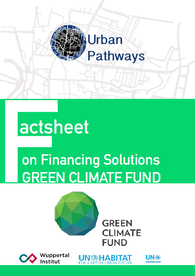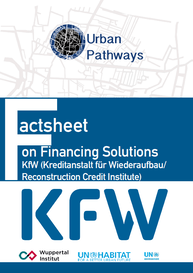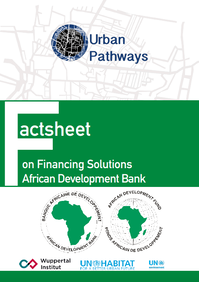|
Pilot City: Pasig
Status: work in progress As in the Philippines’s INDC, the country intends to undertake GHG (CO2e) emissions reduction of about 70% by 2030 relative to its BAU scenario of 2000-2030. Reduction of CO2e emissions will come from energy, transport, waste, forestry and industry sectors. The Department of Energy formulated AlternativeFuels and Energy Technologies Roadmap 2017-2040 which includes a long-term goal of mainstreaming alternative fuel-vehicles, including EVs, in the transport sector. This department and the Department of Transportation (DOTr) have been both supportive of the EV industry and have undertaken programs on electric mobility. For instance, the Department of Energy is implementing a tricycle modernization program by replacing old and polluting 3-wheelers into electric tricycles in selected local government units (LGU). Pasig Cityis among the few LGUs with an office dedicated for transportation concerns, the City Transportation and Development Management Office (CTDMO). The Pasig City government had also implemented several sustainable transport initiatives such as the Carless Sunday, a free bus service featuring Euro-IV buses within the Ortigas CBD. There have likewise been several initiatives focusing on 2&3w modes. In 2011, Pasig City issued “Bicycle Transportation Promotion Ordinance of 2011” which calls for the designation of exclusive lanes for bicyclists on major streets.[1]In 2017 Pasig City launched a network of bicycle lanes within its jurisdiction. Two bicycle-sharing stations were launched in 2013 with the support of ADB to serve as conceptual demonstration, one of which was placed at Pasig City Hall. The bicycles are still being used, but there was no back-end operational support so the bicycles cannot go from one station to the other.[2]Then, in March 2019, Pasig City launched their bicycle-sharing system. There are no electric 2w yet being introduced. |
|
Factsheets
Staus: In progress The factsheets provide a basic introduction to specific measures in the areas of energy, mobility and waste management, which aims to provide a basket of possible solutions to partner cities. |
|
E-learning Programme
Status: In progress Learning resources on Mobility, Energy and Waste Management E-learning programme builds on the toolbox and factsheets and aims to provide a better understanding of possible actions, highlighting the experiences from the implementation of measures in other cities building on the wealth of knowledge of international experts. |
|
Action Tracker
Status: In progress Gives an overview of the Projects progress The Urban Pathways Action Tracker provides an overview of the project’s activities in the cities and reflects on the various action areas. The main objective of this is to share learnings with other cities and identify opportunities for synergies with other projects and initiatives. |
|
Capacity Building
Status: In progress
|
|
Urban Change Maker
Status: In progress The Urban Change Maker Programme actively trains and involves motivated junior and senior experts to contribute our joint effort of delivering on the New Urban Agenda with concepts for low-carbon urban energy, mobility and waste management systems. |
|
City-to-City Partnerships
Status: Pending The partner cities will be supported by exchanging ideas with their peers in other cities who have developed successful urban mobility, energy and resource management solutions. This will focus on the story behind the success on governance, finance and regulatory issues.
|
|
Regional Replication
Status: Pending Implementation is the main focus of the project. As result of the structured process of the project we will identify feasible urban energy, mobility and resources management options in our partner cities. We work closely with development bank partners and financing sources, such as the Green Climate Fund towards assessments of the feasibility of concrete implementation projects. |
|
Policy Environment Assessment
Status: Pending Summary
Pasig, a highly urbanized city in Metro Manila, Philippines, had a population of 755,300 in 2015 (evening) and is estimated to have a daytime population of over 1.2 million people. Pasig City has a land area of 34.32 sq km and comprises 30 barangays (administrative divisions). The Philippine GDP per capita is 2,989 US$. Its CO2emission in 2014 is 1.1 metric tons per capita. Philippines is also a net importer of fossil fuels. The share of renewables in total gross generation mix in the country in 2015 is 25.4%. The main public transport in the country includes jeepneys (15-person paratransit vehicles), buses, Asian Utility Vehicles (AUVs), or tricycles. |
|
Policy Recommendations
Status: Pending Policy measures at the local and national level can be critical to the transformation of urban energy, mobility and resource sectors, for example they regulate systems, provide technological standards, generate funding, impose taxes and set policy objectives. As part of the cooperation with the partner cities, Urban Pathways provides on-demand policy advice. |
|
Project Development
Status: Work in Progress One of the core objectives is the development and implementation of projects that help decarbonising urban energy, mobility and resource sectors. The projects concepts that are considered to be viable will be later developed into bankable projects for which funding will be sought. E-Mobility options in Pasig Electric 2/3wheeler: Cargo Bikes for delivery |
|
Funding Solutions
Status: Work in progress An overview of funding solutions is provided in the toolbox. This section includes updates on the specific funding options that are considered for the partner city. |
|
Implementation Facility
Status: Work in progress The Implementation Facility coordinates the delivery of the project and creates synergies with other initiatives working in the Urban Pathways areas and regions. The facility focuses on knowledge exchange, co-creation and collaboration with partner projects working in the Urban Pathways cities. |
|
Action Plans
Status: Pending The Action Plans summarise key on-going initiatives and identify opportunities for further action with a focus on cross-sectoral synergies and policy interactions between the local and national level. |
|
Bankable Projects
Status: Pending Urban Pathways develops scalable pilot projects in cooperation with the partner cities at a neighbourhood level with an aim to provide a proof of concept of urban energy, mobility and waste management solutions. Based on the pilot project demonstrators, larger-scale projects will be developed to utilise the CO2mitigation potential of an integrated urban energy, mobility and resource management approach and seize the opportunities for contributions the Sustainable Development Goals. This will be done in close cooperation with finance partners and will be geared towards the Green Climate Fund, the Global Environment Facility and similar sources of funding and financing. |
|
Implementation Support
Status: Pending The Urban Pathways team actively support partner cities in the implementation of urban energy, mobility and waste management solutions. This support includes activities jointly initiated under this project and other relevant actions currently on-going in the partner cities. |







































